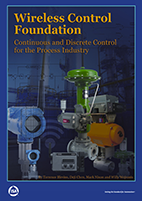The Book
About The Book
In this book the authors address the wireless communication concepts and terminology that are needed to apply wireless control in the process industry. The control system interfaces and wireless field devices described in this book are based on wireless standards for industrial settings and can be used in monitoring and control applications.
Wireless transmitters were initially only used to monitor the process, not to control it. However, over the last seven years wireless measurement has earned high user confidence, and new control techniques have been devised to deal with the characteristics of wireless. Based on the broad acceptance of wireless transmitters, many manufacturers are in the process of developing and introducing wireless final control elements such as on/off and throttling valves.
The book details the recent technical innovations that address control using wireless measurements and final control elements. It presents how control can be structured to manage the slow and non-periodic measurement update rates provided by a wireless transmitter and to compensate for communication delay to the final control element. These new control techniques make it possible to use wireless measurements and wireless valves in closed loop control. The book also presents how wireless measurements may be utilized in model predictive control (MPC).
Multiple application examples are used to show what is required to utilize wireless control. Workshops are included in the book that explores key concepts associated with wireless control. The reader may view the workshop solution by going to the website that accompanies the book.
The book is written for the process or control engineer who is familiar with traditional control but has little or no experience in designing, installing, checking out or commissioning control using a wireless transmitter or wireless valve. The book provides comprehensive coverage of wireless control for both continuous and discrete applications in the process industry. Information is provided on commercially available analog and discrete wireless transmitters and on-off valves.
Since some readers may work with an existing DCS that does not provide native support for wireless field devices, information is provided on how a wireless network may be integrated into a control system using supported serial and Ethernet interfaces. In addition, information is provided on how the PID modifications needed for wireless control may be created using tools supported by the DCS. One chapter of the book addresses how a dynamic simulation of the process and wireless field devices may be easily created in a DCS to support checkout and operator training on wireless control.
You can view presentation materials associated with each chapter by clicking on a chapter title below.
- Chapter 1 Introduction (441KB)
- Chapter 2 History and Background (1.8MB)
- Chapter 3 Wireless Field Devices (832KB)
- Chapter 4 Commissioning Wireless Devices (1.8MB)
- Chapter 5 Control Using Wireless Transmitters (3.1MB)
- Chapter 6 Control Using Wireless Throttling Valves (3.5MB)
- Chapter 7 Discrete Control Using Wireless Field Devices (1.2MB)
- Chapter 8 Model Based Control Using Wireless Devices (2.1MB)
- Chapter 9 Wireless Model Predictive Control (1.3MB)
- Chapter 10 Applying Wireless in Legacy Systems (1.7MB)
- Chapter 11 Simulating Wireless Control (1.7MB)
